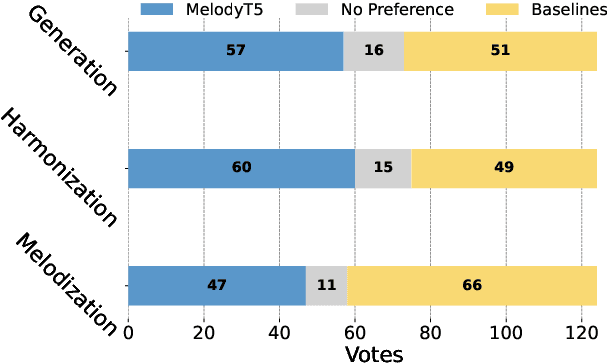Yashan Wang
NotaGen: Advancing Musicality in Symbolic Music Generation with Large Language Model Training Paradigms
Feb 26, 2025Abstract:We introduce NotaGen, a symbolic music generation model aiming to explore the potential of producing high-quality classical sheet music. Inspired by the success of Large Language Models (LLMs), NotaGen adopts pre-training, fine-tuning, and reinforcement learning paradigms (henceforth referred to as the LLM training paradigms). It is pre-trained on 1.6M pieces of music, and then fine-tuned on approximately 9K high-quality classical compositions conditioned on "period-composer-instrumentation" prompts. For reinforcement learning, we propose the CLaMP-DPO method, which further enhances generation quality and controllability without requiring human annotations or predefined rewards. Our experiments demonstrate the efficacy of CLaMP-DPO in symbolic music generation models with different architectures and encoding schemes. Furthermore, subjective A/B tests show that NotaGen outperforms baseline models against human compositions, greatly advancing musical aesthetics in symbolic music generation. The project homepage is https://electricalexis.github.io/notagen-demo.
Exploring Tokenization Methods for Multitrack Sheet Music Generation
Oct 23, 2024

Abstract:This study explores the tokenization of multitrack sheet music in ABC notation, introducing two methods--bar-stream and line-stream patching. We compare these methods against existing techniques, including bar patching, byte patching, and Byte Pair Encoding (BPE). In terms of both computational efficiency and the musicality of the generated compositions, experimental results show that bar-stream patching performs best overall compared to the others, which makes it a promising tokenization strategy for sheet music generation.
CLaMP 2: Multimodal Music Information Retrieval Across 101 Languages Using Large Language Models
Oct 17, 2024



Abstract:Challenges in managing linguistic diversity and integrating various musical modalities are faced by current music information retrieval systems. These limitations reduce their effectiveness in a global, multimodal music environment. To address these issues, we introduce CLaMP 2, a system compatible with 101 languages that supports both ABC notation (a text-based musical notation format) and MIDI (Musical Instrument Digital Interface) for music information retrieval. CLaMP 2, pre-trained on 1.5 million ABC-MIDI-text triplets, includes a multilingual text encoder and a multimodal music encoder aligned via contrastive learning. By leveraging large language models, we obtain refined and consistent multilingual descriptions at scale, significantly reducing textual noise and balancing language distribution. Our experiments show that CLaMP 2 achieves state-of-the-art results in both multilingual semantic search and music classification across modalities, thus establishing a new standard for inclusive and global music information retrieval.
MelodyT5: A Unified Score-to-Score Transformer for Symbolic Music Processing
Jul 02, 2024



Abstract:In the domain of symbolic music research, the progress of developing scalable systems has been notably hindered by the scarcity of available training data and the demand for models tailored to specific tasks. To address these issues, we propose MelodyT5, a novel unified framework that leverages an encoder-decoder architecture tailored for symbolic music processing in ABC notation. This framework challenges the conventional task-specific approach, considering various symbolic music tasks as score-to-score transformations. Consequently, it integrates seven melody-centric tasks, from generation to harmonization and segmentation, within a single model. Pre-trained on MelodyHub, a newly curated collection featuring over 261K unique melodies encoded in ABC notation and encompassing more than one million task instances, MelodyT5 demonstrates superior performance in symbolic music processing via multi-task transfer learning. Our findings highlight the efficacy of multi-task transfer learning in symbolic music processing, particularly for data-scarce tasks, challenging the prevailing task-specific paradigms and offering a comprehensive dataset and framework for future explorations in this domain.
 Add to Chrome
Add to Chrome Add to Firefox
Add to Firefox Add to Edge
Add to Edge